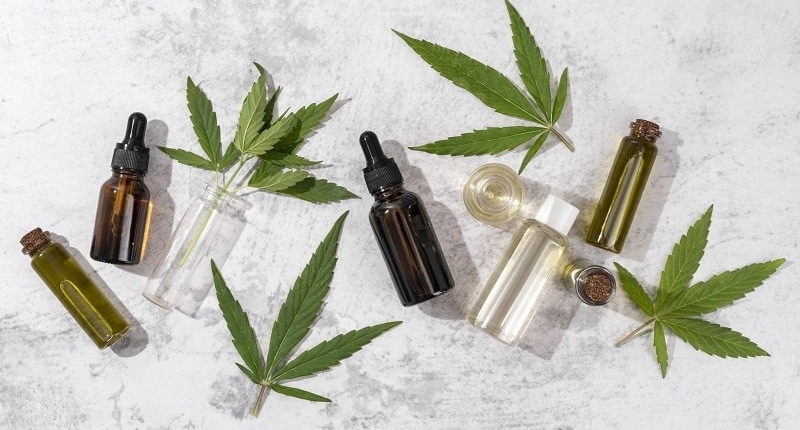CBD Oil For Sleep: Does CBD Help You Sleep?
Battling to get a good night’s sleep is more common than you think, with over 70 million adult Americans suffering from chronic sleep issues. While several therapies and medications help combat insomnia and poor sleep quality, many are expensive or have side effects. As a result, physicians and researchers are turning to CBD oil for sleep as an alternative. Read on to learn more about CBD oil and how it can help with sleep disorders.
Does CBD Oil Help With Sleep?
CBD is one of the two primary compounds found in the Cannabis Sativa plant. In addition to offering many health benefits and helping alleviate chronic pain, researchers have found that taking CBD before bed can improve sleep quality. So, let’s take a look:

How Can CBD Help With Sleep Disorders?
Our bodies have a unique and complex neurochemical network called the Endocannabinoid System (ECS), which uses receptors to regulate various bodily functions, like pain, emotions, hunger, memory, temperature, and sleep. Forming part of this system are natural endocannabinoid molecules that the body releases to stimulate these receptors, which have a similar structure to the CBD molecule produced by the Cannabis plant. As a result, researchers suggest stimulating the natural ECS receptors in our bodies by taking cannabinoids for sleep, pain, or anxiety.
For example, the Hypothalamus, a small pea-sized structure within the brain, is packed with cannabinoid receptors and forms part of the ECS System that impacts sleep regulation and maintains the Circadian Rhythm of our sleep-wake cycle. A Circadian Rhythm is a 24-hour cycle that predominantly helps our bodies to fall asleep at night and wake up each morning.
However, those who struggle with sleep quality may find that the receptors on their Hypothalamus are not adequately stimulated as the body may not produce enough of its own endocannabinoid molecules. In this case, experts recommend supplementing these with CBD oil for sleep, which contains Cannabinoids that stimulate the hypothalamus’ receptors, improving the Circadian Rhythm and preventing poor sleep.
Besides helping to regulate the Circadian Rhythm, marijuana for sleep may also assist with other sleep disorders. For instance, experts may recommend taking THC for sleep. THC, or Tetrahydrocannabinol, is the primary psychoactive found in Cannabis and has sedative properties, which makes it easier to fall asleep. Further, THC minimizes the time spent in the REM sleep phase, diminishing dreaming. As a result, those looking to reduce anxiety or those with PTSD who suffer from night terrors often use THC for sleep.
However, keep in mind that not all medical marijuana for sleep contains the psychoactive THC. CBD oil is made from the plant’s non-psychoactive compound and won’t get you high. As a result, individuals with sleep disorders like Restless Leg Syndrome, pain, or anxiety that reduces their quality of sleep are often given CBD oil for sleep.
Can Cannabis Treat Insomnia?
One of the most common sleep disorders is Insomnia, which makes it difficult for people to fall asleep, stay asleep, or cause them to wake up too early. While acute Insomnia lasts only a few days or weeks, chronic Insomnia can be a continual ongoing problem with several causes like stress or hormone imbalance.
Since Cannabis for Insomnia targets the ECS receptors on the Hypothalamus, it helps to regulate sleep, ensuring that people with Insomnia stay asleep longer. Further, it reduces anxiety and suppresses the overproduction of stress hormones that can cause Insomnia.

How to Take CBD Oil to Aid Sleep?
Those with sleep disorders will find several ways to take CBD for Insomnia. For instance, edibles like CBD gummies, pills and capsules, concentrated vape juice, and tinctures are all available. However, researchers found that CBD oil for sleep may be the most effective since individuals can place a few drops under the tongue and have the Cannabinoids absorbed directly into the bloodstream for fast-acting relief.
How Much CBD to Take Before Bedtime?
Generally, the amount of CBD oil you take depends on several factors, including personal body chemistry, weight, and the severity of your sleeping disorder. For example, some clinical trials have given subjects between 25mg and 1,500mg daily.
However, you may need to take a moderate to the high dose of CBD oil for sleep to achieve a sedative effect. But, remember, a “high” dose depends on each individual – for some, 50 mg may be sufficient.
In contrast, those with chronic anxiety-induced insomnia may need up to 300 mg. Therefore, it is always best to start with a low dosage and work up to a slightly higher one if necessary. However, you can always contact us with any questions, and we will help you determine your correct CBD dosage.
When to Take CBD Oil for Sleep?
Like any other medication or supplements you may use, CBD takes a while to work its way through your system and take effect. As a result, we don’t recommend popping a few drops just before you’re about to shut your eyes.
Another factor to consider is the type of CBD you have taken, as a gummy will take longer to absorb into your bloodstream than vape concentrate or CBD oil placed under your tongue.
In most cases, CBD oil or vapes can take between 15 to 30 minutes to take effect. However, CBD oil in gummies can take up to 60 minutes to make an impact.
However, we recommend taking your CBD oil at least an hour before bed to ensure you fall asleep quickly and comfortably.

Does CBD Interact With Other Prescriptions?
Cannabinoids for sleep have the potential to interact with over-the-counter medications, herbal supplements, and other prescriptions you may be taking. While some medications can be reduced or modified to allow for CBD use, others should never be taken in conjunction with CBD.
The medications we take are broken down in the liver by specific enzymes. However, CBD affects these enzymes, preventing them from working correctly. As a result, you may end up with too much or too little medication in your body, which can cause increased side effects or prevent the medicine from working correctly. This can be dangerous for individuals taking blood thinners like Warfarin, anti-seizure medication, thyroid and heart rhythm medication, antibiotics, or anti-depressants. There are over 57 medications that have drug interactions with CBD that are extremely dangerous.
Since CBD oil for sleep can be potentially harmful if used in combination with certain medications, it is always best to advise your physician if you take cannabinoids for sleep. Additionally, suppose you are already taking prescriptions, other over-the-counter medications, or herbal remedies. In that case, it is always best to obtain medical advice or a diagnosis from a qualified physician instead of self-medicating. Further, a qualified doctor can put you up for recommendation which allows you to get a medical marijuana card in California.
Cannabinoids offer a more natural way to improve the quality of sleep without nasty side effects and help combat the effects of several sleep disorders.
So, if you would like to know more about the benefits of CBD oil for sleep or have questions about dosage, you are welcome to give us a call. Alternatively, visit us at our Torrance Medical & Recreational Marijuana Dispensary.





